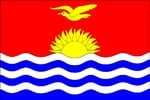Includes historical data for Kiribati’s Gross Domestic Product growth, debt-to-GDP ratio and more, as well as information on trade, banking and financial sector leadership.
An Economy Dependent On Outside Support
Kiribati, officially known as the Republic of Kiribati, is an archipelago nation of 33 islands in the central Pacific Ocean. After gaining independence from the United Kingdom in 1979, today Kiribati faces numerous economic challenges. With the public sector dominating employment and only a small share of the remaining labor force participating in the formal economy, foreign assistance and remittances are essential revenue sources. Despite efforts by the Investment Promotion Division to attract investment, regulatory inefficiencies hinder private-sector development.
While the rule of law is respected, Kiribati is also penalized by underdeveloped commercial regulations, high credit costs, and not being a member of the World Trade Organization. Given Kiribati’s limited domestic production ability, it must import nearly all essential goods and manufactured items. With a population of about 130,000 primarily concentrated in the Gilbert Islands, the republic is highly vulnerable to climate change-related hazards, particularly sea-level rise and saltwater intrusion into freshwater lenses.
Macroeconomy & Sovereign Data
| Type of Government | Presidential republic |
|---|---|
| Capital | Tarawa |
| Sovereign Ratings |
S&P: Not rated Moody’s: Not rated Fitch: Not rated |
| Total Population | 129,000 |
| Median Age | 22.9 |
| Adult Per Capita Income (PPP) | 9,185.61 |
| Total GDP (2025) | USD 0.3 billion |
Kiribati GDP & Economic Overview
Most Recent Content
Kiribati
Sorry, no posts matched your criteria.
Banking & Finance
Trade & Investment
| Total Exports | USD 5.2 million (2024) |
|---|---|
| Leading Exports |
Fish Coconut Oil |
| Total Imports | USD 202.7 million (2024) |
| Leading Imports |
Ships Centrifuges Refined Petroleum Rice Raw Sugar |
| Source: | IMF, CIA The World Factbook |
Kiribati Leading Companies
| Bank of Kiribati | Financials |
|---|---|
| Kiribati Airlines | Transportation, Airlines |
| Kiribati Copra Mill | Consumer Staples, Food Products |
Major Trade Partners — Import
| Fiji | 16.3% |
|---|---|
| China | 15.8% |
| Australia | 14.5% |
| Singapore | 13% |
| New Zealand | 9.08% |
Major Trade Partners — Export
| New Caledonia | 27.53% |
|---|---|
| Malaysia | 19.12% |
| Japan | 19.05% |
| Fiji | 12.99% |
| United States | 10.38% |
Global Finance Rankings & Awards
Data Sources:
UN World Population Prospects
World Inequality Report
S&P Global Ratings
Moody’s
Fitch Ratings
IMF Direction of Trade Statistics (DOTS)
UN Conference on Trade and Development (UNCTAD)
CIA The World Factbook
World Bank’s World Integrated Trade Solution
Forbes Global 2000



